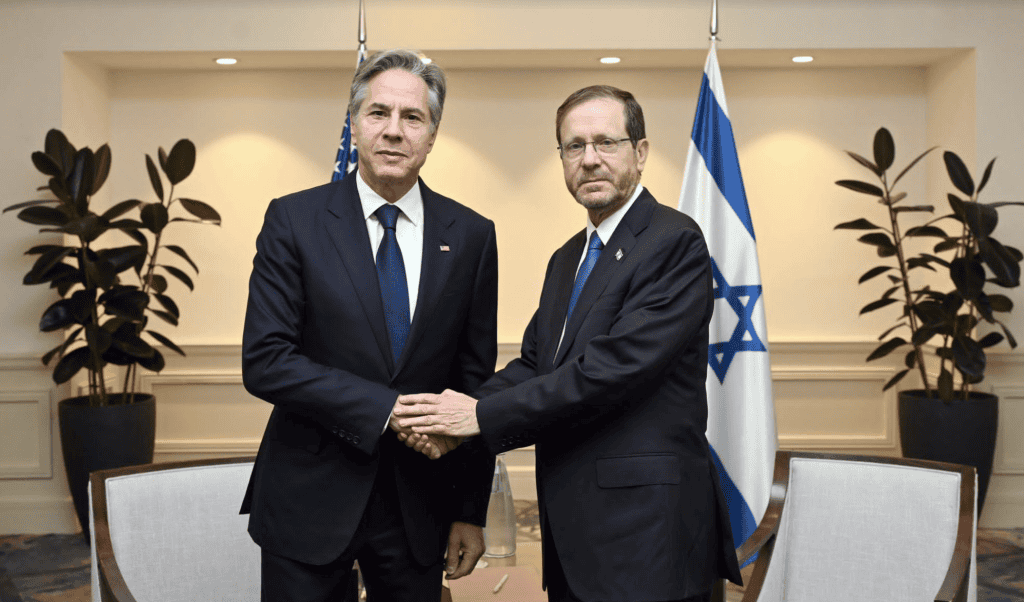
On the morning of Thursday, November 30, two terrorists attacked a bus stop at the entrance to Jerusalem, killing three Israelis and wounding several others. The two terrorists, brothers from the east Jerusalem neighborhood of Sur Baher, used an M-16 style rifle and a handgun in the attack. Both men had previously been detained for ties to terrorism, and Israeli authorities have linked both of them to Hamas. Sur Baher is one of a number of neighborhoods in east Jerusalem that has become rife with terror threats in the last decade.
The attack took place during rush hour just before eight in the morning at a popular bus stop at the entrance to the city. The same bus stop was targeted in November 2022 by a bombing. The suspects in that attack were later identified as supporters of ISIS. Israeli Prime Minister Benjamin Netanyahu said he “directed that the homes of the two terrorists who perpetrated today’s attack in Jerusalem be sealed and demolished, that extensive arrests be carried out among those who supported and dispatched them, that illegal weapons be collected, and that focused actions be carried out against the circles of support for the terrorists, including economic actions against lawbreakers,” according to a statement from the Prime Minister’s Office.
The attack came as Israel and Hamas had agreed to extend the pause in fighting for another day. Hamas attacked Israel on October 7 and fifty days of fighting followed before the current pause. Almost 400 IDF soldiers have been killed since October 7 and around 800 civilians were killed in Israel. In the early hours of November 30, it was still unclear if Hamas would be able to produce a list of hostages to be freed that would meet Israel’s demands. At the center of the dispute was the fate of three members of the Bibas family, including two young children. Hamas and Israel agreed to a pause in fighting that began on Friday, November 24. Hamas released fifty hostages in exchange for 150 Palestinian prisoners, many of them convicted terrorists. Over the past week, Hamas has also released seventeen hostages from Thailand, a Filipino hostage, and three hostages with Russian citizenship.
On November 30, Hamas released two Israeli hostages during the day. The IDF said that the hostages were transferred to the Red Cross and then to Israeli forces near the security fence between Israel and the Gaza Strip. They were then taken to an airbase. It was unclear why this method of release took place during the day and near the security fence, as opposed to via Egypt. It appears Hamas is holding the hostages in various areas spread across Gaza and that this has determined some of the changes in how Hamas is releasing them. It was unclear on the evening of November 30 (in Israel) if the pause in fighting would be renewed for another day. The original agreement had specified five days and included options to renew for an additional five. However, disputes over finding women and children hostages combined with claims by Hamas that other groups in Gaza are holding hostages have led to delays.
U.S. Secretary of State Antony Blinken visited Israel on Thursday and met with a number of Israeli leaders, including President Isaac Herzog, Prime Minister Benjamin Netanyahu, and Defense Minister Yoav Gallant. This is the latest of multiple trips made by Blinken to Israel and the region since the October 7 attack by Hamas on Israel.
November 30 also saw several other incidents, including a terrorist ramming attack carried out in the West Bank. The IDF said the perpetrator was eliminated. “Two IDF soldiers were lightly injured in the attack. The soldiers were evacuated to a hospital to receive medical treatment,” the IDF said. Additionally in northern Israel, a drone infiltrated Israeli airspace from Lebanon. The IDF said that air defenses intercepted the “suspicious aerial target.” This was a rare incident on the Lebanese border, where Hezbollah has generally observed the pause in fighting.
The Iran-backed Houthis in Yemen, however, have continued to threaten shipping vessels off the coast of Yemen, according to statements in the Houthi’s Al-Masirah media on Wednesday and Thursday. They claim they are targeting commercial ships linked to Israel after hijacking one ship with such a connection earlier this month. In Yemen, an explosion outside Sanaa showed a large pillar of smoke rising from a rural area. This led to speculation about airstrikes. U.S. Central Command said they did not carry out airstrikes in Yemen. The USS Carney shot down a drone flown from Yemen this week, and two ballistic missiles were also fired near the USS Mason earlier this week.







